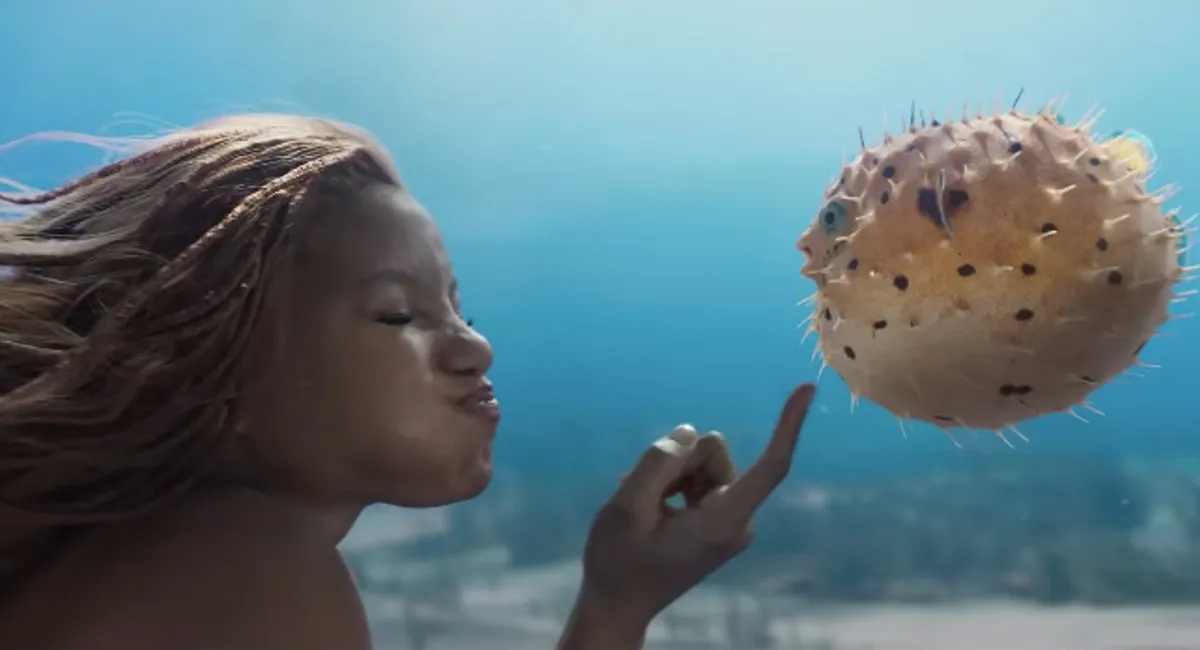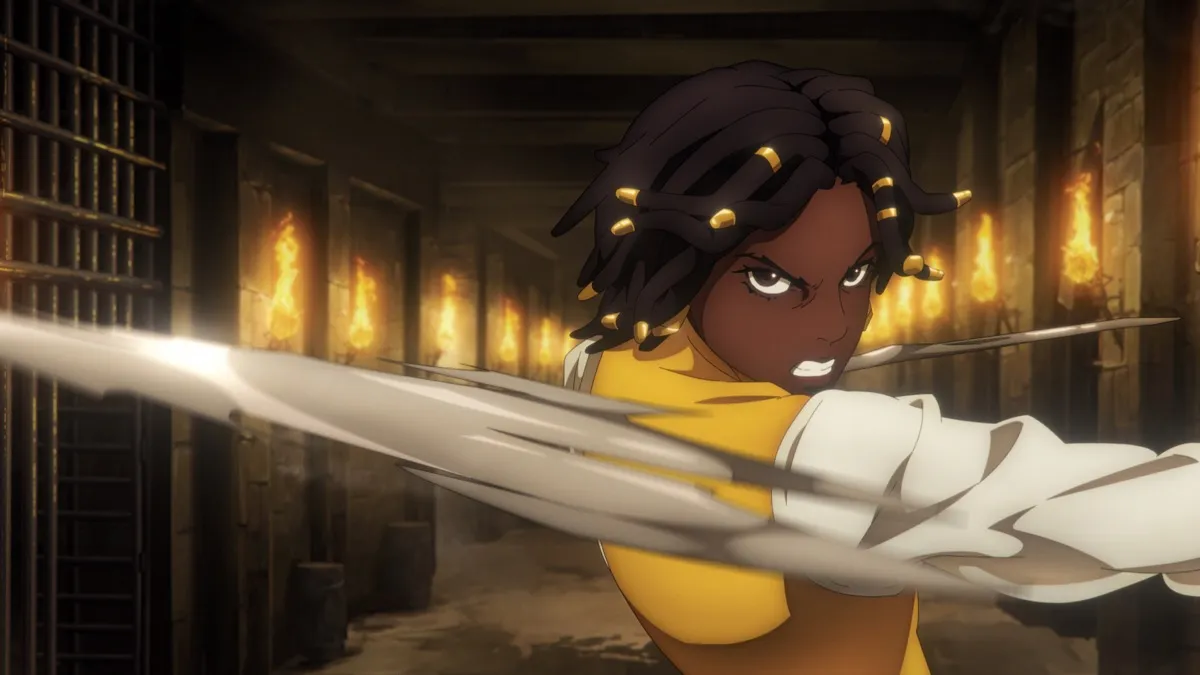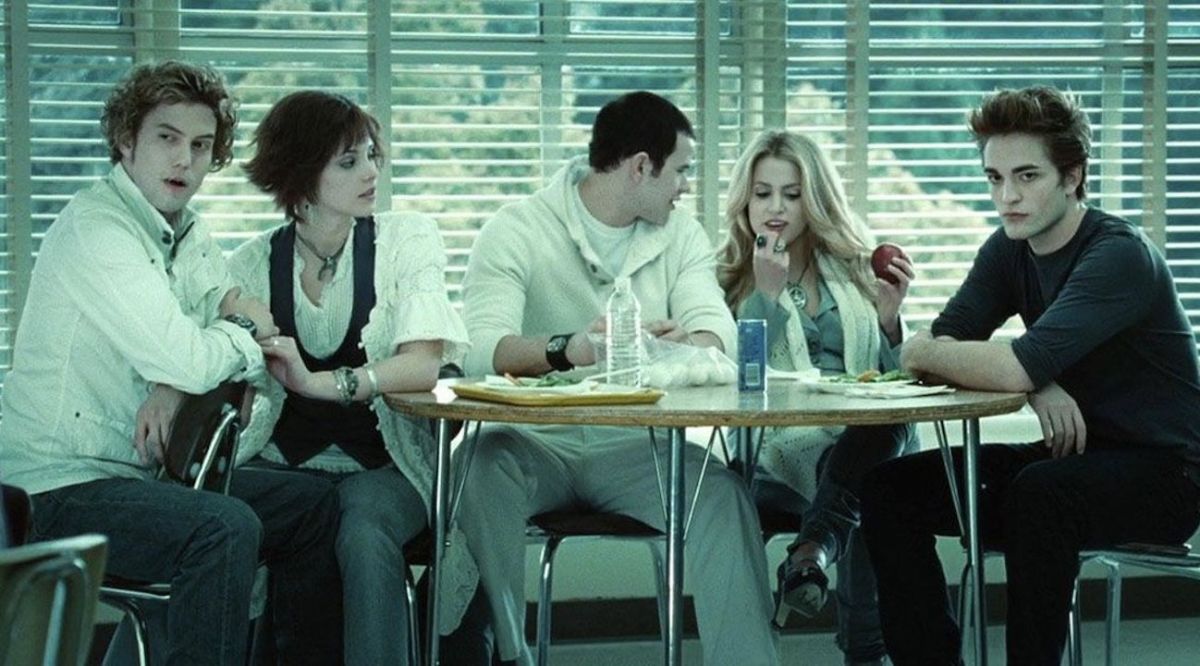Before I knew any details about the new spinoff of Netflix‘s hit adult-animated show Castlevania (itself based on a Konami game), Castlevania: Nocturne, I learned via online backlash that there was a Black woman with pink hair and that was a “problem” for some wishing to explain their bigotry away with “science” and “reason.” The most viral post discussing this was sarcastic, but enough of the replies and similar discussions weren’t. That anger and others with similarly silly criticisms resulted in Google and Rotten Tomatoes review bombs for the show. (Barely noticeable on IMBD unless you look at the comments.)
A handful of people have insisted their issue isn’t that she’s Black. They seek to distance themselves for the loud crowd of people enthusiastically hating her (and others’) presence, especially as Drolta Tzuentes is character that’s likely race-bent. Critics of the ombré black-to-pink hair who want to hide their racism claim its styling breaks the immersion of 1790s France. The vampires, element bending, monsters, glowing eyes and more? Oh, that’s somehow fine. That can leave a person engaged in a work of fantasy, but a vampire with excellent styling? Bring forth the guillotines.
Unfunnily enough, this criticism of unrealistic hair hasn’t extended to the big bad, with red hair so unnaturally vibrant it could compete with a Coke can.
Maybe these detractors didn’t get that far and still want a scientific basis for why Drolta—a vampire—has pink hair. Like Black people in France, dyeing hair unnatural colors has been a thing for a while. Coloring hair goes back to at least the Stone Age, but the most robust evidence comes from 1500 BCE in Egypt. (Also, the home of Drolta.) A millennium later, Romans and Greeks would expand with with some of the first hair lightening techniques. They also used non-natural hair colors like indigo. And also, none of this matters because it’s a show about vampires and a work of fiction. The hair color of one baddie doesn’t harm or disrupt the story.
Ask ’em my questions and get some answers

This song and dance sounds so familiar … almost like we’ve heard it before! Upon the casting of Halle Bailey, of ChloexHalle, as Ariel in the live-action version of The Little Mermaid, people tried to “reason” why her casting didn’t make sense. Beyond the general racism, people tried to dig into the “science” of why they think that a Black mermaid is unbelievable as opposed to a white one. Trolls tapped into the age-old stereotype that Black people can’t swim. I’m living proof that this isn’t true, but also, the high rates of people who can’t swim come from anti-integration efforts and white flight. Racists literally poured acid into pools to keep Black people away. (Like other anti-Black actions, this reaction also hurt many non-Black people.)
Genocidal creep Matt Walsh insisted “from a scientific perspective” that Black mermaids don’t make sense. With the National Enquirer exclusive and Anglerfish in mind, he continued:
“It doesn’t make a lot of sense to have someone with a darker skin who lives deep in the ocean. Not only should the Little Mermaid be pale, she should actually be translucent. That’s what the Little Mermaid should look like. She should be totally pale and skeletal where you can see her skull through her face. And that would actually be a version of Little Mermaid that I would watch.”
Then there’s the “Black people don’t have red hair” lie and the “ginger erasure” criticism. Black gingers do exist due to the recessive MCR1 gene in their ancestry. Actress Erin Mae Kellyman (The Falcon & the Winter Soldier and Willow) is one such high-profile example. The “gingercide” folks had a hard time with Halle’s take on Ariel, in part because Camille Friend (also head of the hair department in Black Panther: Wakanda Forever) made Hailey’s hair red like Ariel’s. Friend wove in natural textures and matched her undertones to find the perfect shade of cooper. These sorts of mental gymnastics are also currently directed at Rachel Zegler—a white Latina with Polish ancestry—because she was cast as Snow White.
Those who don’t even bother with that level of clownery just get right down to brass tacks with the regular racist rigmarole—the “this is [insert word of the moment which as of writing this is ‘woke‘]” crowd that pops out anytime a person of color or (in the case of Star Wars) white women star in a work of fantasy or science-fiction. While they’re certainly louder, it doesn’t even have to be a remake or spinoff for the accusations of “forced diversity” to emerge. The remake economy and its fatigue is real. However, they take out this frustration on POC by means of bad faith vitriol.
The nonsensical Castlevania copium

Like frustration with live-action remakes, there has been some legitimate criticism of Castlevania: Nocturne. People have taken issue with pacing, the cliffhanger, and more. A handful of other criticisms, I’ll admit I don’t quite understand because I’ve had a spotty past with this franchise. However, when the reviews are dominated by almost as many 1 stars as 5 stars, with far less in between, on a relatively uncontroversial work, alarm bells go off.
Scattered generously across the 1 star reviews of the show are people calling the mere inclusion of people of color, queer characters, a white-vampire plantation owner, and the Haitian Revolution some part of an “agenda”—and all the other similar words that go with it. If you see the existence of POC as “forced diversity” unless they meet the impossibly high expectations you set up, you’re racist. Also, you probably haven’t made it this far into the article unless it’s for a monetized reason.
As for the inclusion of queer characters … I’ve got news for you, buddy. Vampires since at least Bram Stoker’s publication of Dracula have been super duper gay. Victorian era social anxieties about (among several other things) sexuality and gender were reflected in the novel. Pansexual and bisexual are the default in all vampire fiction unless otherwise stated, with one large exception in Forks, Washington.

Speaking of Twilight, lots of American writers (and showrunners) have had a fascination with portraying Condeferate and slave-owning vampires in a neutral to positive light. Continue to cry about a sole white-vampire slave owner and use the note cards reading “Black people owned slaves too” and “Slavery has always been around” to blow your nose because we do not care.
The accusation that it’s “politicization” to include non-white core characters and the Haitian Revolution is hilarious to me when the French Revolution is the center of the story. This story could have zero Black people or references to Haiti and would still remain very political. These two political events are so intertwined, but Haiti’s storying being ignored and diminished (especially how the U.S. and France punished the emancipated slaves) is an actual act of political and historical sabotage.
(featured image: Netflix)










Published: Oct 12, 2023 04:08 pm